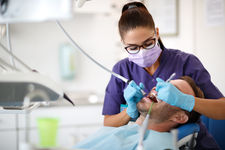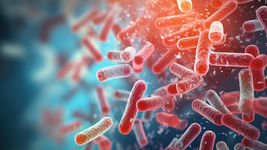Dentist / Dental Units
Safety and hygiene in dental practices are crucial to ensure the well-being of patients and staff. One important aspect is the quality of the water used in your practice and dental units. Water nebulization in dental units, for example, can cause unwanted water contamination in patients, such as legionella, pseudomonads, E. coli or coliform germs.
Water testing is therefore essential to detect bacterial contamination and ensure compliance with hygiene standards. By implementing such a testing program, dental practices can fulfill their responsibilities and meet legal requirements at the same time.
The regular microbiological testing of water from dental units in accordance with the recommendation of the Commission for Hospital Hygiene and Infection Prevention at the Robert Koch Institute (KRINKO) can be easily carried out with us.
Services

Dental Basic
Legionella spp.,colony count 36°C
Dental Basic Package
This water analysis package includes testing for Legionella and colony count (36°C). According to the specifications of the Robert-Koch-Institute (RKI), these are the relevant microbiological parameters for dental practices that should be tested for at least once a year.
You can integrate the Dental Basic Analysis Package into the hygiene plan of your practice or clinic in order to monitor the water quality and thus fulfill your duty of care.
The analysis according to the RKI recommendation contains the following parameters:
-
Legionella spp.
-
colony count 36°C
Product description

Dental Plus
Legionella spp., colony count 36°C, Pseudomonas aeruginosa
Dental Plus Package
Due to the increased risk of infection in the care of patients with weakened immune systems, the RKI has issued an extended specification for testing the water for microbial parameters. The analysis for Legionella and the colony count (36°C) is extended to include Pseudomonas aeruginosa.
You can integrate the Dental Plus package into the hygiene plan of your practice or clinic. This serves to monitor the water quality in order to fulfill your duty of care. According to RKI specifications, these are the extended microbiological parameters for dental practices that should be tested for at least once a year.
The analysis according to the extended RKI recommendation contains the following parameters:
-
Legionella spp.
-
colony count 36°C
-
Pseudomonas aeruginosa
Product descriptions
Do you have any questions? Do you need a different analysis or more analysis parameters?
Contact us to discuss your requirements, for example
-
to analyze water for E. coli and coliform germs
-
for testing water from hand wash basins
-
to check water hygiene before connecting a dental unit.
Why is the hygiene of water in dental practices important?
Tap water in Germany is usually of very high quality, but is still not sterile and may contain germs or substances of concern. In general, these are harmless quantities. However, it becomes problematic if pathogens multiply to high concentrations in the water.
Hygienically clean water is essential in dental practices. It not only comes into contact with open wounds during rinsing, but can also be inhaled when nebulized during treatment.
In dental units, water contamination in the hoses is often caused by stagnant water, which makes it easy for bacteria to multiply and form biofilms. Water samples from each dental unit must therefore be analyzed for relevant microbiological parameters such as the general bacterial count, legionella or pseudomonads.
A water analysis provides you with quick and reliable clarity about possible microbiological contamination in your practice.
Who is responsible for ensuring water quality at the dentist?
Drinking water safety is initially the responsibility of the water supplier. They must guarantee the water quality up to the house connection. From the house connection onwards, however, the owners of the practice are responsible for compliance with water hygiene standards.
Neither patients nor practice staff should be exposed to a risk from potential germ contamination in the water. Regular water tests are therefore required in the practice in order to monitor the water quality and to be able to act quickly in the event of anomalies.
FAQ
Contact
Like what you see? Contact us today to discuss your water analysis needs!
Ready to place an order?






